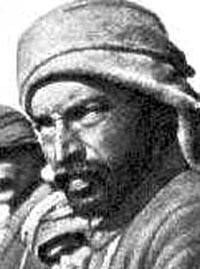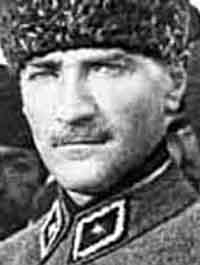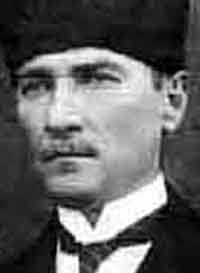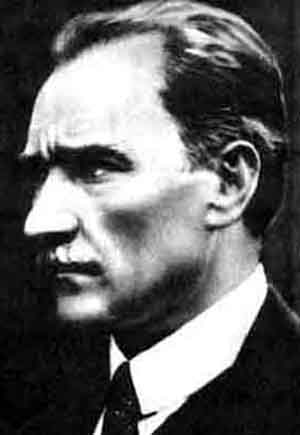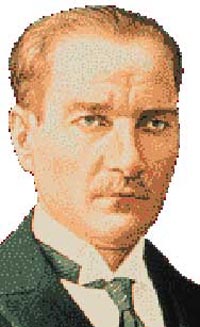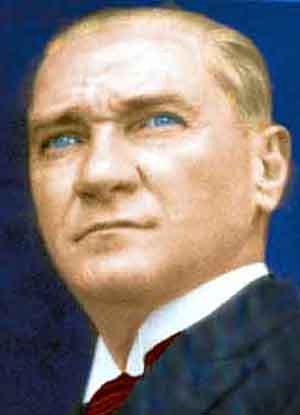Mustafa Kemal Ataturk
Copyright Michael D. Robbins 2006
Astro-Rayological
Interpretation & Charts
Quotes
Biography
Images and Physiognomic Interpretation
Ataturk-Mustafa Kemal—Turkish Statesman, “Father of the Turks”
(Date and time both speculative, per Marc Penfield) March 12, 1881, Salonika, Greece, 22:00 LMT.
(Ascendant, Scorpio; Sun and Mercury retrograde in Pisces; Moon in Leo conjunct the MC; Venus conjunct Neptune in Taurus conjunct the MC with Pluto also in Taurus; Mars in Aquarius; Jupiter conjunct Saturn in Aries; Uranus in Virgo)
Mustafa Kemal Pasa (later knows as Kemal Ataturk) was a soldier, statesman, and reformer who was the founder and first president (1923-38) of the Republic of Turkey. He modernized the country's legal and educational systems and instituted economic planning. Significantly, he encouraged the adoption of a European way of life, with Turkish written in the Latin alphabet and with citizens adopting European-style names and clothes.
Ataturk was a disciple upon the first ray, a disciple of Shamballa. The Tibetan had the following to say about him:“I would point out that Ataturk, the Turkish dictator, within certain personality limitations of relatively negligible moment, made good use of first ray energy, and only the testimony of future historical records will indicate fully how wisely, sanely and disinterestedly he used this type of force for the attainment of first ray objectives. It might be apposite here to point out that such first ray exponents of force are often misunderstood and hated. They may and often do misuse the energy available but they also use it constructively within the desired limits of the immediate plan.”(DON 16)
Kemal Ataturk was born (speculatively) with the Sun in Pisces. It is interesting that both he and George Washington, fathers of their respective countries were born in Pisces (Washington, certainly, and Ataturk, speculatively so). Gorbachev, too, who presided over the dismantling of the Soviet Union was also born in Pisces—signaling in these instances an appointment with national destiny .
Ataturk rose to power as a talented soldier. During World War I he commanded the Ottoman forces which repelled the Allied attack on Gallipoli (1915). Though once he became president of the new republic he was perceived as both ruthless and dictatorial, he modernized Turkey with a series of sweeping reforms—introducing a new constitution, new civil and criminal codes, abolishing polygamy, giving women the vote (note Venus—the planet of “women” placed conjunct to the seventh house cusp (representing the law) and conjunct the planet Neptune, again pointing towards receptivity to the feminine energy.
His roles as a reformer can be seen astrologically in the elevated Uranus in Virgo in H10. Since Virgo is the sign which represents the “mother” or the “woman” we can understand from the Virgo placement of Uranus that his reforms greatly (and positively) affected the status of women in Turkey. This Uranus is loosely opposed Mercury in Pisces indicating that he was open to new ideas, and, as a first ray disciple, sought to enforce them.
Assuming the reasonableness of this speculative chart, we find it no surprise that he was considered a dictator. The Moon (in this case a veil for the planet Uranus) is squarely upon the MC in the self-assured, often dictatorial sign Leo. This position reveals command and self-certainty. Uranus is often considered the “dictator” (Hitler had this planet rising) and it seems clear that the Leo Moon veils Uranus (interestingly, the hierarchical ruler of Leo). Uranus, is, essentially, a first ray and demonstrably seventh ray planet of reformation.
There is a strong possibility that the reformative, Uranian seventh ray was Ataturk’s personality ray. It is interesting that at an early age Mustafa became enamored of the military uniforms worn by the military cadets, and this, in part, induced him to join the military. Further, Kemal was his nick name, conferred upon him by his mathematics teacher; it means “the perfect one”!
Scorpio on the Ascendant is suitable for a militant reformer (its exalted planet is revolutionary Uranus), and Mars, its ruler, gives the military capacity. It is interesting that atMustafa's birth, his Father, a lieutenant in a local militia unit, hung his sword over his son's cradle, dedicating him to military service. The inconjunct aspect between Uranus (the reformer) in perfectionistic Virgo, 150º from militant Mars in Aquarius (the sign of reformation and of the New Age), demonstrates the kind of forceful reformation he initiated. He had the spirit of a revolutionary and from his earliest military years was found to be involved with various clandestine subversive groups. Mars also opposes the Moon, which points to the warfare within his own nature (one suspects that he often swallowed his personal pride for the sake of social progress) and again indicates his military propensities. The Mars/Moon opposition (indicating the rebellion of the lunar forces—within and without—may also suggest him as a candidate for the third initiation.
The first ray soul of Ataturk worked not only through Uranus but through Pluto (in Shamballic Taurus), Pluto being the esoteric ruler of his Sun Sign, Pisces, and the special ruler of his Rising Sign, Scorpio. One can see some of the drastic reforms through Pluto’s placement in the seventh house of law and social contract.
Whatever severity was applied through Saturn (another partially first ray planet giving purposeful restraint in Aries) is compensated by Jupiter also in Aries, and conjunct to Saturn—offering a vision (Jupiter) of great and new potential. These two Aries planets placed in the sixth house indicate his tendency to initiate (Aries) and work for (sixth house) improved conditions (economically and in terms of employment), and thus to serve (sixth house). The sixth house indicates much of the daily mundane life, and clearly he had new ideas (calling for both expansions {Jupiter} and enforced restraints {Saturn}) about how to create new and practical possibilities for the average Turkish citizen.
A balanced, enlightened and, overall, intuitive approach is indicated by Venus, the planet of the soul in the sign of enlightenment, Taurus, and conjunct the intuitive planet Neptune. The capacity to force group changes is indicated by Mars (esoteric ruler of the speculative Ascendant) in the group sign, Aquarius, essentially conjuncting the IC—thus focussing “at home”—i.e., within his own country.
Through his many struggles (defending his country from invasion) and resisting and overcoming internal recalcitrant, obstructively conservative elements, he founded the modern Republic of Turkey, for which he is still revered by the Turks. He succeeded in restoring to his people pride in their Turkishness, coupled with a new sense of accomplishment as their backward nation was brought into the modern world. Over the next two decades, Atatürk created a modern state that would grow under his successors into a viable democracy.
The legacy of national pride and accomplishment can again be seen as a result of the better qualities of the pronounced Leo energy, so elevated in this speculative chart. Leo is the sign of self-esteem—in this case a legitimate self-esteem. The elevation of the self-image of Turkey was furthered by the supportive trine of bountiful Jupiter in hopeful Aries to the Leo Moon.
From the disciplic perspective Ataturk was “on the cross”, his Mars/Moon opposition forming a T-Square with the Venus/Neptune conjunction and a cross, if the Ascendant is included. Note that this is the “Fixed Cross” of discipleship, and, certainly, Ataturk was a disciple if not an initiate of some standing.
One day my mortal body will turn to dust, but the Turkish Republic will stand forever.
Peace at home, peace in the world.
I am not ordering you to attack, I am ordering you to die.
Do not be afraid of telling the truth.
To see me does not necessarily mean to see my face. To understand my thoughts is to have seen me.
A healthy mind in a healthy body.
Sovereignty is not given, it is taken.
Authority, without any condition and reservation, belongs to the nation.
Teachers are the one and only people who save nations.
Our true mentor in life is science.
A nation devoid of art and artists cannot have a full existence.
We Turks are a people who, throughout our history, have been the very embodiment of freedom and independence.
Those heroes that shed their blood and lost their lives... you are now lying in the soil of a friendly country. Therefore rest in peace. There is no difference between the Johnnies and the Mehmets to us where they lie side by side here in this country of ours... You the mothers who sent their sons from far away countries wipe away your tears. Your sons are now living in our lands and are in peace. Having lost their lives on this land they have become our sons as well.
This was a tough and fearless fighting leader who was one of 2 or 3 who changed the outcome of the Anzac campaign. Here are two orders that he issued.
25 April 1915: "I do not order you to attack; I order you to die. In the time which passes until we die other troops and other commanders can take our places".Circa. 29 April 1915: "Every soldier who fights here with me must realize that he is in honour bound to not to retreat one step. Let me remind you all that if you want to rest there will be no rest for our whole nation throughout eternity. I am sure that all our comrades will agree on this and that they will show no signs of fatigue until the enemy is finally hurled into the sea."
Ataturk shaped the destiny of a nation which was alone and dying. He gave it a new future. Under his progressive nationalist leadership his country broke free from its passive, inward-looking and parochial conservatism, ingrained through long centuries of habit, and from the defeatism and apathy engendered by the inexorable decline of its imperial power. Aiming to replace the image of Turkey as ' the Sick Man of Europe ' with that of a dynamic and self-renewing non-imperialist country capable of winning the respect of its more advanced European neighbours, he led his country out of the Middle Ages into the twentieth century in a mere couple of decades.
He achieved this through a co-ordinated series of sweeping reforms, all directed towards the creation in Turkey of a western-style democracy. These changes were so drastic that it is impossible to conceive that anyone could have brought them about if he had not been, like Mustafa Kemal, a national hero twice over as a result of his leadership at Gallipoli and his single-handed master minding of the Turkish War of Independence, which ended with the departure of all foreign armies from Turkish soil.
The philosophy behind Ataturk's reforms is now known as Kemalism. In February 1937 he had the following six principles written into Article Two of the Constitution of the Turkish Republic:
The first four principles provide the basis for the new political life of the country, and the last two lay down the guidelines for his reforms.
Mustafa Kemal Atatürk (1881–10 November 1938), until 1934 Mustafa Kemal, Turkish army officer, statesman and revolutionary, was the founder and first President of the Republic of Turkey.
Atatürk was born in the city of Thessaloníki (Turkish: Selânik) in Northern Greece, where his birthplace is commemorated by a museum at the present day Turkish Consulate. In accordance with the then prevalent Turkish custom, he was given the single name Mustafa. His father, Ali Riza (Efendi), was a customs officer who died when Mustafa was a child. His mother's name was Zübeyde (Hanim).
Mustafa studied at the military secondary school in Selânik, where the additional name Kemal ("perfection") was bestowed on him by his mathematics teacher in recognition of his academic brilliance. Mustafa Kemal entered the military academy at Manastir (now Bitola) in 1895. He graduated as a lieutenant in 1905 and was posted to Damascus. He soon joined a secret society of reform-minded officers called Vatan (Motherland), and became an active opponent of the Ottoman regime. In 1907 he was posted to Selânik and joined the Committee of Union and Progress commonly known as the Young Turks.
The Young Turks seized power from the Sultan Abdul Hamid II in 1908, and Mustafa Kemal became a senior military figure. In 1911, he went to the province of Libya to take part in the defence against the Italian invasion. During the first part of the Balkan Wars Mustafa Kemal was stranded in Libya and unable to take part, but in July 1913 he returned to Istanbul and was appointed commander of the Ottoman defences of the Gallipoli area on the coast of Thrace. In 1914 he was appointed military attache in Sofia, partly to remove him from the capital and its political intrigues.
He was later promoted to the rank of colonel and assigned the command of a division in the Gallipoli area. He played a critical role in the battle against the allied British, French and ANZAC forces during the Battle of Gallipoli in April 1915, where he held off allied forces at Chunuk Bair and on the Anafarta hills. For this success, he was later promoted to the rank of Brigadier General, thus aquiring the title of pasha. He gained increasingly greater degrees of influence on the war effort.
Kemal gained much respect from his former enemies for his chivalry in victory, and the Kemal Atatürk Memorial has an honoured place on ANZAC Parade in Canberra. It includes his words:
"Those heroes that shed their blood and lost their lives... you are now lying in the soil of a friendly country. Therefore rest in peace. There is no difference between the Johnnies and the Mehmets to us where they lie side by side here in this country of ours... You the mothers who sent their sons from far away countries wipe away your tears. Your sons are now living in our lands and are in peace. Having lost their lives on this land they have become our sons as well."
During 1917 and 1918 Mustafa Kemal was sent to the Caucasus front to fight against Russian forces, in which he had some success. He was later assigned to the Hejaz, to suppress the Arab Revolt against Ottoman rule. After resigning his commission, he eventually returned to serve in the unsuccessful defense of Palestine. In October 1918 the Ottomans capitulated to the Allies, and Mustafa Kemal became one of the leaders of the party in favour of defending the area roughly occupied by present day Turkey, while agreeing to withdraw from all the non-Turkish territories.
Mustafa Kemal became in 1919 the leader of the Turkish emancipation. With a small and ill-equipped army, he repelled both the invading forces and the Sultan's troops and local rebels, eventually gaining control of the Turkish homeland. By September 1922, he had triumphed against both external enemies and internal opposition. Already a military hero, he proclaimed as the struggle ended that the military triumph must be followed by "victories in such fields as culture, scholarship, science, and economics."
He was briefly married to Latife Usakligil between 1923 and 1925.
The government sent Mustafa Kemal Pasha to Samsun in North-Central Anatolia to take command of the nineteenth Army, a formation which, in accordance with the restrictions placed on the empire by the Allies in the Treaty of Sèvres, was supposed to be disbanded. This was meant to be an insult to Kemal, who, being a nationalist, was an enemy of Sultan Mehmed VI's capitulatory government. He then turned the tables and seized the opportunity to free Turkey from Allied occupation. In June 1919, on orders, he left the capital, Istanbul, and founded a Turkish nationalist movement in Samsun, but the movement would soon be based in Ankara. In April 1920, a provisional Parliament, the Grand National Assembly, was formed in Ankara, offering Kemal Pasha the title 'President of the National Assembly'. This body repudiated the Sultan's government in Istanbul and refused to recognize the Treaty of Sèvres.
The Greeks understood the threat posed to their position on the Aegean coast by the rapid consolidation of Kemal Pasha's forces in central Anatolia and advanced inland to meet them. Conflict between the two armies was inconclusive, but the nationalist cause was strengthened the next year(1921)with a series of brilliant victories. Twice (in January and again in April) Ismet Pasha defeated the Greek army at Inönü, blocking its advance into the interior of Anatolia. In July, in the face of a third offensive, the Turkish forces fell back in good order to the Sakarya river, eighty kilometers from Ankara, where Atatürk took personal command and decisively defeated the Greeks in the twenty day Battle of Sakarya in August-September 1921. During this period, the Turkish forces benefitted from Italian and French aid, while the Great Powers withdrew their previous support for Greece.
In the meanwhile, Kemal Pasha signed the Treaty of Kars (October 23, 1921) with the Soviet Union, a treaty of friendship in which Turkey ceded the city of Batumi, in present-day Georgia, to Lenin's Bolsheviks in return for sovereignty over the Armenian cities of Kars and Ardahan.
Final victory over the Greeks came in the Battle of Dumlupinar in August 1922.Kemal Pasha's victory in the War of Independence assured Turkey's sovereignty. The Treaty of Lausanne superseded the Treaty of Sèvres and Turkey recovered all of Anatolia and eastern Thrace from the Greeks and Armenians. During those battles, Turkish forces burnt the city of Smyrna (Izmir) killing 300,000 ethnic Greeks. The following years represented more friendly relations between the two countries, with the Greek Prime Minister (ex-enemy during the Turkish Independence war after WW1) Eleftherios Venizelos even nominating Ataturk for a Nobel Peace Prize in 1934.
Kemal Pasha spent the next several years consolidating his control over Turkey and instituting a variety of wide-ranging political, economic and social reforms.These reforms caused some opposition in Republican People's Party which was founded by Mustafa Kemal in September 9th 1923. Then Mustafa Kemal directed General Kazim Karabekir to establish Progressive Republican Party for opposition in Turkish National Assembly. This party opposed state socialism of Republican People's Party and suggested liberalism. But after some time, the new party was taken over by people Ataturk considered fundamentalists. In 1925, partly in response to the provocations of Sheikh Said, the Maintenance of Order Law was passed, giving Ataturk the authority to shut down subversive groups. The Republican People's Party was quickly disestablished under the new law, an act seen by some as necessary for preserving the Turkish state, but seen by others as the act of a dictator.
On August 11th, 1930 Mustafa Kemal decided to try a democratic movement once again. He charged Ali Fethi Okyar with establishing a new party. In Mustafa Kemal's letter to Ali Fethi Okyar, laicism was insisted. At first, brand new Liberal Republican Party succeeded all around the country. But once again the opposition party became too strong in its opposition to Ataturk's reforms, particularly in regards to the role of religion in public life. Finally Ali Fethi Okyar abolished his own party. And Mustafa Kemal never succeeded in democratising the parliamentary system.
Kemal also oversaw the forced deportation and extermination of over a million ethnic Greeks from all over Turkey, but particularly along the Black Sea coast.
Mustafa Kemal regarded the fez (which Sultan Mahmud II had originally introduced to the Ottoman Empire's dress code in 1826) as a symbol of feudalism and banned it, encouraging Turkish men to wear European attire. The hijab (veil) for women, while never formally banned, was strongly discouraged; and women were encouraged to wear western apparel and enter the country's workforce. From 1926, the Islamic calendar was replaced with the Gregorian calendar. In 1928 the government decreed that the Arabic script be replaced by a modified Latin alphabet, and citizens between the ages of six and forty were required to attend school and learn the new alphabet. The conservative clergy fiercely opposed these reforms, trying in vain to maintain its traditionally strong influence. As a result of the reforms literacy increased dramatically. The reforms also included extensive removal of Arabic and Persian words from the Turkish language.
Mustafa Kemal opened new schools, where, as part of the curriculum, fine arts were taught to boys as well as girls. Girls had traditionally been excluded entirely from education, but a universal system of education was introduced for children of both sexes. He also lifted the Islamic ban on alcoholic beverages: Mustafa Kemal had an appreciation for the national liquor, raki, and consumed vast quantities of it. In 1934 he promulgated a law requiring all Turks to adopt surnames. The Grand National Assembly gave him the deferential name Atatürk, meaning "father of Turks," and assumption of that name by other men is still forbidden by law.
Seeking to limit the influence of Islam on Turkish political and cultural institutions, which he regarded as one of the principal causes impeding Turkish development, Mustafa Kemal Atatürk abolished the 1300-year-old Islamic caliphate on 3 March 1924 and established a western-style separation of church and state ("mosque" and state) in Turkey. While promoting a secular Turkish state, Atatürk maintained the traditional Ottoman tolerance of religious diversity and freedoms, but viewed these freedoms in the western Enlightenment sense of freedom of conscience.
Atatürk himself was Muslim. In the book Kemalizm, Laiklik ve Demokrasi (Kemalism, Laicism and Democracy), Ahmet Taner Kislali quotes from a speech of Atatürk that may reveal some of the reasoning behind his support of the separation of church and state:
"Religion is an important institution. A nation without religion cannot survive. Yet it is also very important to note that religion is a link between Allah and the individual believer. The brokerage of the pious cannot be permitted. Those who use religion for their own benefit are detestable. We are against such a situation and will not allow it. Those who use religion in such a manner have fooled our people; it is against just such people that we have fought and will continue to fight. Know that whatever conforms to reason, logic, and the advantages and needs of our people conforms equally to [Islam]. If our religion did not conform to reason and logic, it would not be the perfect religion, the final religion" (31).
Such thoughts would seem to buttress the statement of Atatürk's biographer, Patrick Kinross, concerning how Atatürk—who prized science and rationalism as the basis of morality and philosophy—considered himself a rational believer of Islam in that Islam could complement science and rational thinking. The quote also shows how strongly Atatürk was opposed to fanaticism ("the pious"). Another speech quoted by Kislali relates Atatürk's thoughts on how Islam came to be in such a degenerate state:
"The foundation of our religion is very strong. The material is strong as well, but the building itself was neglected for hundreds of years. As the plaster dropped down, none thought to replace it and none felt the need to reinforce the building. Quite the contrary: many foreign elements and interpretations, as well as empty beliefs, came along and damaged it still more" (ibid.).
With abiding faith in the vital importance of women in society, Atatürk launched many reforms to give Turkish women equal rights and opportunities. The new Civil Code, adopted in 1926, abolished polygamy and recognized the equal rights of women in divorce, custody, and inheritance. The entire educational system from the grade school to the university became coeducational. Atatürk greatly admired the support that the national liberation struggle received from women and praised their many contributions: "In Turkish society, women have not lagged behind men in science, scholarship, and culture. Perhaps they have even gone further ahead." He gave women the same opportunities as men, including full political rights. In the mid-1930s, 18 women, among them a villager, were elected to the national parliament. Later, Turkey had the world's first female supreme court justice.
Atatürk once stated: "Culture is the foundation of the Turkish Republic." His view of culture included both his own nation's creative legacy and what he saw as the more admirable values of world civilization, and he put an emphasis on humanism above all. He once described modern Turkey's ideological thrust as "a creation of patriotism blended with a lofty humanist ideal."
So as to assist in the creation of such a synthesis, Atatürk stressed the need to utilize the elements of the national heritage of the Turks and of Anatolia—including its ancient indigenous cultures—as well as the arts and techniques of other world civilizations, both past and present. He emphasized the study of earlier Anatolian civilizations, such as the Hittites, Phrygians, and Lydians. The pre-Islamic culture of the Turks became the subject of extensive research, and particular emphasis was laid upon the fact that—long before the Seljuk and Ottoman civilizations—the Turks had had a rich culture. Atatürk also stressed the folk arts of the countryside as a wellspring of Turkish creativity.
The visual and the plastic arts—whose development had on occasion been arrested by some Ottoman officials claiming that the depiction of the human form was idolatry—flourished during the presidency of Atatürk. Many museums were opened; architecture began to follow more modern trends; and classical Western music, opera, and ballet, as well as the theater, also took greater hold. Several hundred "People's Houses" and "People's Rooms" across the country allowed greater access to a wide variety of artistic activities, sports, and other cultural events. Book and magazine publications increased as well, and the film industry began to grow.
Atatürk died in 1938 of cirrhosis, a probable consequence of his strenuous lifestyle and heavy drinking for many years.
His successor, Ismet Inönü, fostered a posthumous Atatürk personality cult which has survived to this day, even after Atatürk's own Republican People's Party lost power following democratic elections in 1950. Atatürk's face and name are seen and heard everywhere in Turkey: his portrait can be seen in all public buildings, on all Turkish banknotes, and even in the homes of many Turkish families. Giant Atatürk statues loom over Istanbul and other Turkish cities. He is commemorated by many memorials all over Turkey, like the Atatürk International Airport in Istanbul and the Atatürk Bridge over the Golden Horn.

